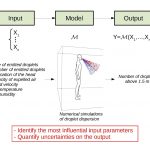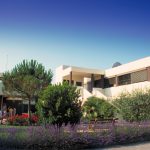Team seminar
2025
February 21st, Seminar by Paola Cinnella
- When: Thursday, February 21st 2025 at 14:00 (CET)
- Where: Coriolis (Galois building)
- Speaker: Paola Cinnella (Institut Jean Le Rond d’Alembert, Paris)
- Topic: Quantification and reduction of RANS model uncertainties through regional Bayesian calibration and model mixtures.
- Abstract: Accurate turbulent closures for the Reynolds-Averaged Navier-Stokes (RANS) equations are essential for a wide range of applications in engineering. Despite a plethora of proposed RANS models, there is no consensus on a single « best » model, and model choice is based on expert judgment. The uncertainty about model choice corresponds to an « epistemic » uncertainty, i.e. due to the loss of information about turbulent motions associated with the averaging process. Furthermore, RANS model require the specification of several closure coefficients using (uncertain) data for a small set of « canonical » flows (representative of limiting behaviors of turbulence), leading to so-called « parametric » uncertainties. The quantification and reduction of both such uncertainties is then of the utmost importance for reliable flow simulations.
Bayesian statistical methods such as Bayesian updating of model parameters and Bayesian Model Averaging (BMA) can be used to deal with both parametric and epistemic uncertainties.
In the last decades, Bayesian calibration and BMA have been applied to the quantification of RANS modelling uncertainties.
However, 1) the choice of the calibration scenarios remains a source of uncertainty and can lead to non-optimal compromise solutions for model parameters, while 2) BMA model weights are constant throughout the covariate space, in contrast with the observation that model performance depends on the local flow physics, some models being better than others at capturing some physical processes. As a consequence, BMA cannot perform better than the best model in the mixture (even if it cannot perform worse than the -unknown- worst one).
In this talk, we present and compare various approaches for calibrating “expert” models for capturing specific flow processes, and automatically combine them through a model aggregation approach that, unlike BMA, assigns regionally variable weights to the competing models. These include Clustered Bayesian averaging and mixtures of expert models. Such methods promote best-performing models in their region of expertise while downgrading unsuitable models, thus achieving better performance than any of the individual models. The procedure also provides estimates of the predictive variance. Results are shown for simple flows and turbomachinery applications.
January 21st, Seminar by Franck Ruffier
- When: Tuesday, January 21st 2025 at 14:00 (CET)
- Where: Coriolis (Galois building)
- Speaker: Franck Ruffier (CNRS, SBI-Biorobotics research group at Institut des Sciences du Mouvement, joint research unit with Aix-Marseille University)
- Topic: Early vision for robotics.
- Abstract: The talk will present bio-inspired vision systems for robotics, particularly utilizing early vision, such as optic flow, for aerial navigation (Serres & Ruffier 2017). For instance, we show recently that visual models enable robots to assess and control attitude without accelerometer, explaining some insect flight capabilities (de Croon et al. 2022). Moreover, collective motion models solely based on early vision demonstrated how spherical robots can achieve swarming and milling behaviors using panoramic visual information (Castro, Ruffier & Eloy 2024, Castro, Eloy & Ruffier 2024).
2024
Archives of 2024 seminars
2023
Archives of 2023 seminars
2022
Archives of 2022 seminars
2021
Archives of 2021 seminars
2020
Archives of 2020 seminars





